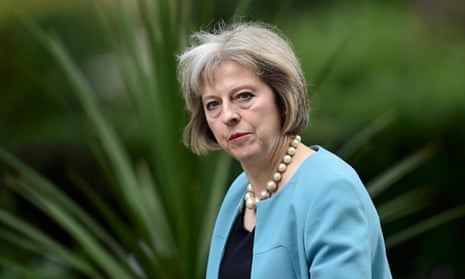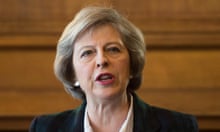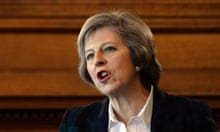The home secretary, Theresa May, has refused to share with law enforcement agencies or communications companies the full details of her new “snooper’s charter”, raising fresh fears that she is seeking to limit dissent in order to steamroller the controversial laws through parliament.
The revelation, contained in a report into the future of surveillance legislation published by David Anderson QC, the independent reviewer of terrorism legislation, was described as “extraordinary” by the recently retired leader of the Association of Chief Police Officers, Sir Hugh Orde.
The original communications data bill, known as the “snooper’s charter”, was blocked by the former deputy prime minister, Nick Clegg, three years ago. It would have required internet companies to track and log users’ web history for a year to allow access by police and security services. The Conservatives had been working on a revamped bill to be implemented in the event of a majority Tory administration.
Anderson, however, reports that, because of the political impasse, there has been “very little consultation between government, law enforcement and service providers for more than two years”. He adds: “In particular, the communication service providers have not been shown the text of the revised draft bill that was prepared in early 2013; the National Crime Agency does not believe it has seen the final draft text; and I was myself refused permission to share it (or even a summary of it) with them ...
“Law enforcement itself wishes to reserve its detailed position on these proposals pending further discussions with a government that has a political mandate to take it forward.”
A source close to the home secretary said the National Crime Agency had not made a “formal request” for the full draft bill, but admitted that Anderson had been told not to share it. She added: “He [Anderson] did not ask if he could share it with the NCA. He asked if he could share it more widely but, because it wasn’t agreed government policy, that wasn’t appropriate.”
The source said it was “not right” to say that May was seeking to minimise dissent by keeping her proposals secret, citing the plans for a joint committee in parliament to scrutinise the legislation. Anderson’s report was published on Friday and was expected to inform a debate on the communications data bill. However, within hours of its publication Downing Street was suggesting it would reject the main proposal to strip ministers of the power to authorise interception of communications by Britain’s security services.
May told the Commons she was “not in a position to say whether the government will do one thing or another”, but told MPs she wished to push the controversial bill through this autumn, with the new powers in place by December 2016.
Eric King, deputy director of Privacy International, said: “We don’t know what she is intending. Just a couple of months ago, without any warning, they changed the law on the Computer Misuse Act, on the eve of a legal case we were pursuing, to exempt the intelligence services from provisions making hacking of computers illegal.”
Orde said that, while “extraordinary”, the failure to consult followed a trend. “It doesn’t surprise me. The government has not troubled to engage with the police in a thoughtful way. It is policymaking by speechwriters. The cost is we are always advising post-events, when it would be far more constructive pre-event. That would have led to better-informed policy that doesn’t need to be changed.”










Comments (…)
Sign in or create your Guardian account to join the discussion